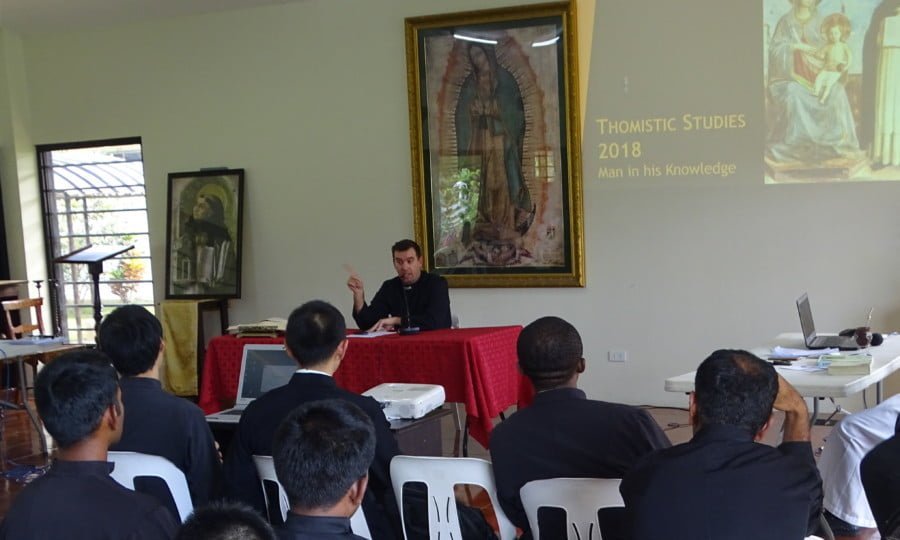Thomistic Studies 2018
“Faith and reason are like two wings on which the human spirit rises to the contemplation of truth; and God has placed in the human heart a desire to know the truth—in a word, to know Himself—so that, by knowing and loving God, men and women may also come to the fullness of truth about themselves.” Thus does St. John Paul II begins his great encyclical on faith and reason, Fides et Ratio.
We can thus see that the Catholic understanding of man is as a creature endowed by God his Creator with reason, which although darkened and impaired by the Fall and Original Sin, is nevertheless still not completely destroyed. We can, through the use of this gift, reach some truths about God, although the fullness of His Truth and for the truth to be manifest in its totality, without admixture of error and to be known by all for their salvation in a convenient way, we need the light of revelation. As Blessed Pope Paul VI teaches (in his Credo of the People of God, n5) “It is important in this respect to recall that, … the intellect which God has given us reaches that which is, and not merely the subjective expression of the structures and development of consciousness;”
St. John Paul II again reminds us that “For the ancients, the study of the natural sciences coincided in large part with philosophical learning. Having affirmed that with their intelligence human beings can “know the structure of the world and the activity of the elements… the cycles of the year and the constellations of the stars, the natures of animals and the tempers of wild beasts” (Wis 7:17, 19-20)… “ (Fides et Ratio, n19).
From the gnoseological errors of Ockham, Suarez, Decartes and Kant, are spawned the philosophical foundation of this age of the dictatorship of relativism in which we live, as Pope Emeritus Benedict XVI so aptly phrased it, where this simple truth, that we can actually know things, is often denied. There is posited an abyss between things and what we are able to know about them, between phenomena and noumena.
For the Angelic Doctor, St. Thomas Aquinas and also of his illustrious predecessors in the theory of knowledge, such as Aristotle, these modern fads are all old news which should have long been cast in the trash bin of history. Parvus error in initio magnus erit in fine, thus goes the old Scholastic axiom which is proven true as history (or rather corruption) of gnoseological development post St. Thomas shows, where instead of the ens, being, as primum cognitum, and hence the basis of knowledge, modernism has made knowledge as the foundation of being and reality this determined by what we know.
Because of the importance that knowledge and its foundations have in philosophy and theology, the topic for the Thomistic Studies held in our House of Formation in Lipa this year focused on ‘Man in His Knowledge’ during which papers are presented on various elements concerning the historical, doctrinal and theological questions of knowledge.
The seminarians and fathers of the IVE and the sisters of the SSVM gave presentations on the thought of a wide selection of philosophers on gnoseology, beginning with Socrates, Plato and Aristotle, leading to the great synthesis of St. Thomas Aquinas and the subsequent fall of Suarez, Decartes and Kant.
The expositions were done in English and Chinese and presented the various stages of knowledge, starting from the actuation of the external senses to the formation of the verbum mentis in the intellect and how the notion of participation, as Fr. Cornelio Fabro has pointed out, so crucial in the thought of St. Thomas, also underlies Thomistic Gnoseology. We also heard presentations on the Knowledge of Christ the Incarnate Word, the Science of God and Moral Science. After each presentation, the Panel and the people were able to question the presenter for more clarification and in this way, all were able to participation in the discussion.
The days of the Thomistic Studies, which was very educational for the members of our Religious Family and guests as well as for the participants and presenters themselves, ended with a Holy Mass presided by Fr. Miguel Soler, IVE our Provincial Superior. May St. Thomas Aquinas continue as a beacon of reason for the Church to enlighten our way to the Truth and may the Blessed Virgin Mary, the Seat of Wisdom, obtain from Our Lord this grace for us.


Leave A Comment